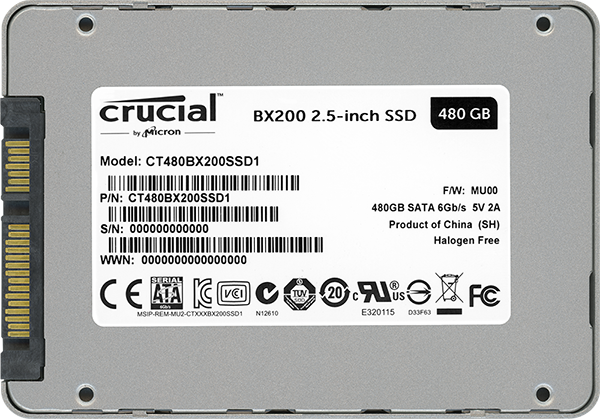The Crucial BX200 (480GB & 960GB) SSD Review: Crucial's First TLC NAND SSD
by Billy Tallis on November 3, 2015 9:00 AM ESTWrapping things up, we knew going into the review that Crucial would face some performance challenges with the move to TLC, and that matching the BX100's good all-around performance would be tricky. A significant drop in random read speeds was listed in the specs, but Crucial advertises modest improvements to other performance metrics. Unfortunately, the BX200 was harder hit than we initially expected.
Random and sequential write speeds both suffer, and sequential writes were hurt relatively more as compared with the BX100. Sequential read speeds were fine, and elsewhere things aren't quite bad enough to make it a one-legged stool. The most acute weaknesses are in areas that are less important to typical desktop usage. Peak performance is much better than sustained performance and reads speeds are much better than write speeds, so for interactive use the BX200 will be much more responsive than most of our tests indicate.
Given our earlier discussion on TLC NAND and consumer pressure to bring down drive prices, it's easy to understand why Crucial wanted to release a TLC drive in the BX series. But it's hard to understand why they're releasing it in what seems to be such a poor performing state. The drive clearly needs at least a firmware overhaul, and it's a horrible way to introduce Micron's 16nm TLC to the world. The BX100 doesn't need a successor yet, as it's still the best all around value you can get from a SSD.
Crucial plans to rapidly retire the BX100, so the BX200 will soon be standing alone as Crucial's budget offering. If the BX100 is being retired for having poor profit margins, then it seems like it could tolerate a bit of a price increase and still have a place in the market. If the switch is motivated by Micron diverting large amounts of production capacity from MLC to TLC, then we have to question the viability of their plans for roling out TLC. Micron needs to introduce a good TLC product as soon as possible to demonstrate that the 16nm TLC has a reason for existing in the first place. From what we've seen so far, Micron may have been better off sticking with MLC until after switching to 3D NAND.
| Amazon Price Comparison (11/3/2015) | |||
| Drive | 240/250/256GB | 480/500/512GB | 960GB/1TB |
| Crucial BX200 (MSRP) | $84.99 | $149.99 | $299.99 |
| ADATA Premier SP550 | $72.99 | $154.99 | - |
| SanDisk Ultra II | $83.99 | $153.99 | $299.00 |
| Crucial BX100 | $79.99 | $159.99 | $360.00 |
| Crucial MX200 | $94.99 | $169.99 | $329.99 |
| Plextor M6V | $99.99 | $189.99 | - |
| OCZ Trion 100 | $93.99 | $175.36 | $349.99 |
| OCZ Arc 100 | $91.99 | $149.99 | - |
| Samsung 850 EVO | $87.99 | $163.88 | $346.00 |
In the end the MSRP for the BX200 is around or below where retail prices for the BX100 have been—$85 for 240GB and $150 for 480GB—so it likely will be cheaper than its predecessor and push SSD prices at or below $0.30/GB. But even being the cheapest SSD on the market wouldn't be sufficient to earn a recommendation; almost anything else would be worth paying extra for. We have a saying around here that "there's no such thing as a bad product, only a bad price" and even for the BX200 this is true. But at MSRP, the BX200 won't be putting much price pressure on the rest of the market, and there are other drives with similar prices and better performance. The best thing for consumers right now would be for the BX200 to further push down costs, at which point it can survive as a true low-budget SSD.











85 Comments
View All Comments
paulgj - Tuesday, January 26, 2016 - link
I see the MU02 firmware for this drive is out, are there any plans to retest?LarsBars - Tuesday, February 2, 2016 - link
The BX200's are getting cheap now, and they have a new firmware update, MU02. Any chance that you could re-run the BX200's through the tests and see if anything is improved? Thanks!Amoro - Monday, April 11, 2016 - link
I don't see the point since it only states stability/reliability improvements and doesn't mention anything about performance.Release Date: 1/12/2016
Corrected SMART attribute threshold values
Improved general reliability and stability
Minor Bug Fixes and general reliability and stability Improvements
freddell - Saturday, July 2, 2016 - link
I dont know how your IO tests throughput numbers are so high compared to MX100 or MX200. As soon as I tried to clone a 1TB drive for my wifes laptop the write speed dropped to 60 MB/s or less, clearly slower than the HDD it was meant to replace. BX is a truly horrible drive for write performance, I will not recommend to anyone. I dont know why it was not highlighted in your review.dh33r4j - Thursday, August 25, 2016 - link
I got the 480GB for £73 ($95) during lightning sale from Amazon. When the price is right, I think it becomes worth it. For someone moving from a HDD to SSD, I coudn't say no to the offer.